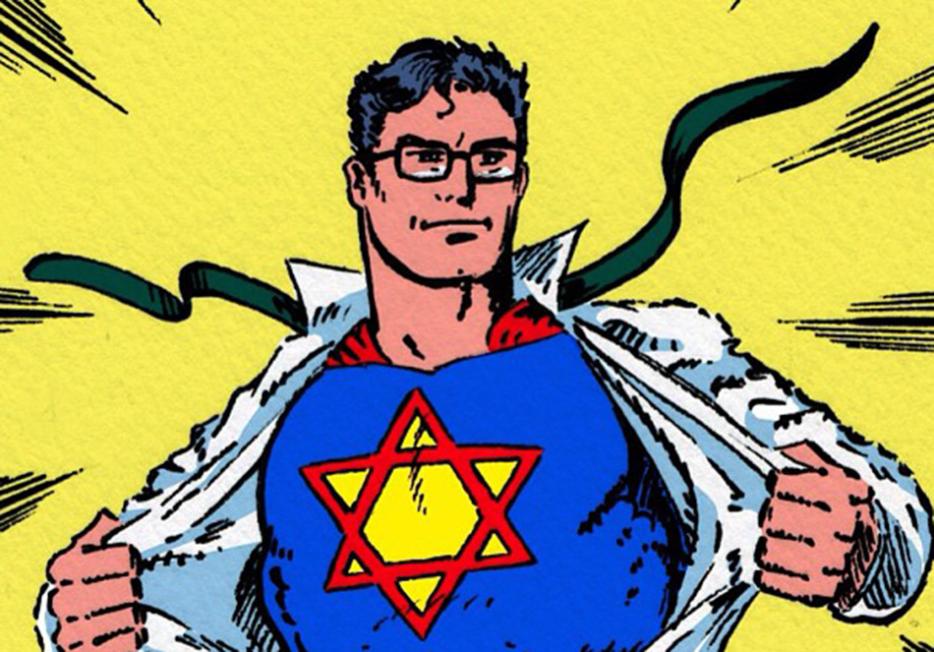I never know how to respond to people who tell me I don't look Jewish—a remark I’ve heard my whole life, even before I bleached my hair blonde. “Thank you” seems inappropriate, and a simple “go fuck yourself” seems a touch too extreme. If I had more presence of mind, I might respond with what's really perplexing to me: What does a Jewish woman look like?
As a child at a Jewish day school near Bathurst and Eglinton in Toronto, I remember a teacher who took pleasure in issuing grave warnings to her class of eight-year-olds: we might have pepperoni on our pizza, and slumber parties on Shabbat, but “it wouldn't stop the Germans”; we would always be Jews. I felt like the most elusive target on a dartboard—different from everyone else, but suspiciously similar. For me, there was a kind of power in belonging, of knowing that a group would lay claim to me no matter how much I fought the affiliation.
Identifying Jews is a favourite game of Jews themselves: my parents and grandparents were always interrupting award ceremonies to point out the Jews receiving honours. “Jewish dads made sure their gangster-crazy kids knew who Edward G. Robinson and George Raft were behind their goyish screen names,” writes Gerard Jones in his 2004 book Men of Tomorrow: Geeks, Gangsters, and the Birth of the Comic Book. “Those dads had grown up viewing American culture through the eyes of outsiders, but the kids knew it was their culture, theirs to take and theirs to remake."
I felt a similar twinge of pride when I first saw the trailer for Man of Steel, the latest Superman film, directed by Zack Snyder. I was at home with friends, watching Mad Men after a long day. A little drunk and a lot tired, I finally saw what my parents and teachers had been insisting: Superman was like me, a secular Jew caught between pepperoni pizza and a disappearing cultural heritage, silently different in plain sight. “Superman is Jewish, you know,” I said to my friends. “Noooooo!” they replied, shaking their heads, as though it had been a boozy remark rather than a statement backed up by dozens of books, academic papers, panel discussions, and museum exhibitions.
Of course Superman is Jewish—even I know this, and I have as little active interest in comic books as in Judaism. Superman is born to parents of a race on the verge of extinction. He is put in a “basket” (spaceship) and travels down a “stream” (through space) to reach some nice, normal, cartoonishly white adoptive parents living on a farm in Kansas. He is raised as though he is like everyone else, but underneath it all, he knows he belongs to a world beyond this one. He will always be “other.” Superman is Moses living in Kansas instead of Egypt.
Then we have Superman’s Krypton name: “Kal-El.” Even with my shitty grasp of Hebrew, I know that “El” is the suffix that means “God” (you know, like Isra-el). A very, very loose reading of the word “Kal” makes it “voice,” and there you have it: Superman is, in name at least, the Voice of God. As multiple scholars have noted, the original spelling of “El” was simply “L”, and the correct English phonetical spelling of ‘Kal’ should probably be ‘Kol.’ But no matter—it’s all in the subtext. "He didn't look Jewish,” writes Larry Tye, in Superman: The High-Flying History of America’s Most Enduring Hero. “...The surest sign that Clark was no Semite came when the bespectacled everyman donned royal blue tights and a furling red cape to transform himself into a Superman with rippling muscles and expanding superpowers. Who ever heard of a Jewish strongman?" But as Tye is fond of saying, “When a name ends in 'man,’ the bearer is Jewish, a superhero, or both.”
Superman is born to parents of a race on the verge of extinction. He is put in a “basket” (spaceship) and travels down a “stream” (through space) to reach some nice, normal, cartoonishly white adoptive parents living on a farm in Kansas. He is raised as though he is like everyone else, but underneath it all, he knows he belongs to a world beyond this one. He will always be “other.” Superman is Moses living in Kansas instead of Egypt.
I’m not religious. I’ve broken just about every rule in Leviticus. I would never deny being Jewish, but I’ve never embraced it, either; I’ve thought of my Jewish identity as something assigned to me. And like any good Jew, I feel guilty about it. Perhaps what I’ve been missing is a Jew I would want to identify with—not a nebbishy stereotype but an archetype of strength. I have enough nice, normal Jewish men in my life and in my popular culture. Maybe I need something super.
“Are you a Mlotek of the Yiddish Theater Mloteks?” asks Danny Fingeroth, author of Disguised as Clark Kent: Jews, Comics, and the Creation of the Superhero and a group editor for Spider-Man at Marvel Comics, when I email him an interview request. I have no idea, so I send back a hesitant “…Maybe?” Despite my ignorance, Fingeroth answers my questions. “The creators of the superheroes, including Superman, did all they could to make their characters seem all-American, not Jewish or any other ethnicity or religion,” he explains. “It’s only in hindsight that we can see how their backgrounds might have affected the content of the work they did.”
Jerry Siegel and Joe Shuster, the creators of Superman, are favourite subjects of the “Did You Know They’re Jewish?” game (as well as “Did You Know They’re Canadian?”), and they first began collaborating while high school students in Cleveland’s Glenville neighbourhood They weren’t particularly observant Jews, but as Tye notes, “When the boys said they didn't grow up very Jewish they meant they didn't go to synagogue much, but Glenville then was like Israel today; just being there, breathing in the culture and street life, was living a Jewish life."
After much trial and error with different heroes and villians, Siegel and Shuster perfected the character of Superman in 1933, in their late teens, but spent about six years trying to find a publisher. Their history follows a classic Jewish trajectory—facing persecution, and barred from the prestigious jobs, they had turned to the less desirable industries. “Anyone who is making a career step to draw or to approach this as a career [in the 1930s] really, you know, they were aspiring to the slicks,” says Peter Birkemoe, owner of The Beguiling Books and Art and one of the founders of the Toronto Comic Arts Festival. “Magazines. Or the commercial illustration. That was a world that was somewhat restricted—you know, the people with the WASP-y names had the edge to fitting in. But comics were the bottom of the barrel. That was where you worked if you couldn’t get a job in any of those better places.”
As a result, many of the artists working in comics during the 1930s were Jewish—which means that many of the heroes we know today have Jewish roots. Birkemoe is not entirely convinced Superman is the superhero with the most obviously Jewish heritage; he’s just the most popular. (Batman was created by a Jew, albeit a Jew from a wealthier family.) Pre-Superman, Siegel and Shuster had written Jewish superhero named Funnyman, who fought crime with the power of his witty quips. “Comedian Larry Davis battled mobsters and gods not with super-strength but with wisecracks, wit, and comedic contraptions, the way Jews had been doing for centuries,” writes Tye. “No carefully sculpted body or small straight nose on this champion.” You can imagine why Funnyman, according to Birkemoe “falls very, very clearly into the category of ‘footnote.’”
“The Jewish inflections in Funnyman were also there in Superman,” Tye continues, “although finding them meant looking closer, the way a Torah scholar might.” In 1938, Superman appeared in the first Action Comics. Siegel and Shuster had put a lot of themselves into him, but in code—they wanted this character to pass easily into the dominant culture, and Superman was so iconically corn-fed that at least one author describes him as emblematic of white privilege. Glen Weldon, in Superman: The Unauthorized Biography, explains the character’s WASP appeal: “his amazing abilities are simply his birthright, coded into his genes like that weird blue-black hair of his. Superman is every handsome, athletic, trust-fund kid who roars his convertible into the high school parking lot as the sweater around his neck flutters in the breeze.”
“Superman's handlers from the beginning planted clues that Superman was Jewish,” Tye writes, “but that evidence was subtle and ambiguous enough that it convinced many readers that Superman was seriously Christian.” As some have pointed out, Clark Kent’s age is mentioned often: 33, the age at which Jesus was crucified and the number of reported miracles He performed. But Superman has been claimed for other religions, too, as Tye writes: Superman is dispatched to Earth with a message from his father, as Muhammad did for Allah; Buddhists have read him as the ultimate man of Zen. “In the end,” writes Tye, “his appeal was his universality along with his particularity, which ensured his stories would live on the way most parables do.”
Zack Snyder’s Superman, a living cartoon of male attractiveness played by Henry Cavill, is sent as his parents’ last hope to continue their besieged race in another part of the universe; his mother, played by Israeli actress Ayelet Zurer, watches as her planet collapses into flames. In Kansas, little Superman tries to fit in, but his survivor’s guilt keeps him from completely assimilating. He’s just too special, which is undeniably in everyone else’s best interests: he can’t stop accidentally lifting school buses, saving oil rigs, saving lives.
“Writers write about what they know about,” says Rabbi Simcha Weinstein, author of Up, Up, and Oy Vey! How Jewish History, Culture, and Values Shaped The Comic Book Superhero. “Jews are not superheroes and superheroes are not Jews, but I would argue that Siegel and Shuster tapped into their heritage on an unconscious level when creating their character. We may never know whether Siegel and Shuster were aware of these precise Hebrew translations; nevertheless, the name [Kal-El] could not be more apt.” In earlier comics, Superman was famously kind of a dick on a moral superiority rampage, and even moral superiority is kind of a Jewish trait; in Notes on Camp, Susan Sontag wrote, “Jews pinned their hopes for integrating into modern society on promoting the moral sense.” By that token, we could even look at Superman’s non-religious affiliations of “Truth, Justice, and the American Way” as just another method of promoting moral Jewish beliefs without identifying them as such.
When I finally watch Man of Steel, Superman’s Jewish identity seems obvious to me. The Moses parallels are especially present; even more so the parallels to pre-WWII kindertransport, when families from all over Europe recognized the growing threat of Nazism in time to send their children away. Zack Snyder’s Superman, a living cartoon of male attractiveness played by Henry Cavill, is sent as his parents’ last hope to continue their besieged race in another part of the universe; his mother, played by Israeli actress Ayelet Zurer, watches as her planet collapses into flames. In Kansas, little Superman tries to fit in, but his survivor’s guilt keeps him from completely assimilating. He’s just too special, which is undeniably in everyone else’s best interests: he can’t stop accidentally lifting school buses, saving oil rigs, saving lives.
Clark Kent’s father warns him about the fear he’ll inspire in his neighbours if they learn the truth about him, which is not something a Christian needs to worry about; there’s also a villain obsessed with propagating a new Krypton with “pure” bloodlines, another non-issue for the true believers of Kansas. No, this Superman is Jewish—a very Woody-Allen-wish-fulfillment kind of Jew. He performs good deeds without seeking credit or rewards, the highest form of mitzvah in the Bible. He balances himself between the Old World and the New without betraying either (avenging his parents while also telling the FBI he’s just a nice boy from Kansas—after taking out a surveillance drone, representing another kind of liberal fantasy hero). In one scene, his shoulder muscles appear so overdeveloped that I laughed out loud, to the great chagrin of the fanboys beside me. But he hides those muscles well under his plaid shirt, corduroy jacket, and, of course, eyeglasses.
By the end of the film, we’ve established Superman as a person who fights for justice on his own terms and with his own set of rules, and Clark Kent as a mild-mannered, if alarmingly good-looking Daily Planet staffer. His two identities co-exist equally. That’s the dream the Superman mythology speaks to: Jewishness as a secret power, an identity that you can put on or take off. Like most nice Jewish boys I know, Superman even has a nice WASP-y girlfriend by the end of Man of Steel, played by Amy Adams here, my favourite of the recent Lois Lanes. Adams plays her as someone well matched for Superman: moral, hard-working, unafraid to call a dick-measuring contest when she sees one. I wonder if she’ll convert.






